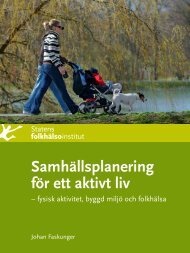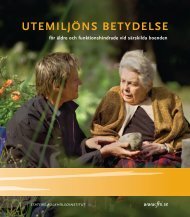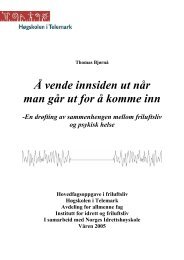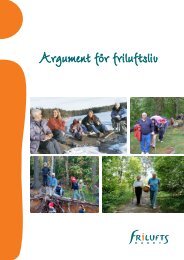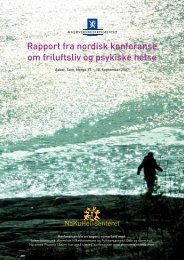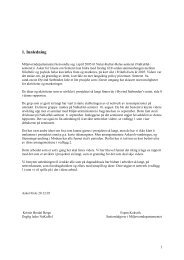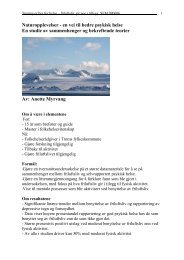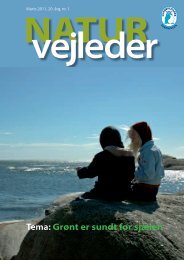Green Care: A Conceptual Framework - Frisk i naturen
Green Care: A Conceptual Framework - Frisk i naturen
Green Care: A Conceptual Framework - Frisk i naturen
You also want an ePaper? Increase the reach of your titles
YUMPU automatically turns print PDFs into web optimized ePapers that Google loves.
(Wilson, 1984) has been highly influential. The idea has been developed in<br />
a collection of essays entitled, ‘The Biophilia Hypothesis’ edited by Kellert<br />
and Wilson (1993).<br />
Wilson described biophilia as “the innately emotional affiliation of human<br />
beings to other living organisms. Innate means hereditary and hence part of<br />
ultimate human nature. Biophilia, like other patterns of complex behaviour,<br />
is likely to be mediated by rules of prepared and counter-prepared learning<br />
– the tendency to learn or to resist learning certain responses as opposed<br />
to others. From the scant evidence concerning its nature, biophilia is not a<br />
single instinct but a complex of learning rules that can be teased apart and<br />
analysed individually” (Kellert and Wilson, 1993, p. 31).<br />
The biophilia hypothesis tries to explain how and why “the innate tendency<br />
to focus on life and lifelike processes” (Wilson, 1984, p. 1) may be a primal<br />
biological need of our species. Wilson further underlines that this need does<br />
not only have an impact on our material and physical maintenance, but<br />
also on the human craving for aesthetic, intellectual, cognitive, and even<br />
spiritual meaning and satisfaction (Kellert and Wilson, 1993).<br />
Kellert and Wilson (1992) conclude that the biophilia hypothesis is:<br />
■■<br />
■■<br />
■■<br />
■■<br />
■■<br />
inherent (that is, biologically based)<br />
part of our species’ evolutionary heritage<br />
associated with human competitive advantage and genetic fitness<br />
likely to increase the possibility for achieving individual meaning and<br />
personal fulfilment<br />
the self- interested basis for a human ethic of care and conservation of<br />
nature, most especially the diversity of life.<br />
The biophilia hypothesis theorises that humans attune selectively to<br />
the presence and condition of animate natural elements (i.e. plants and<br />
animals). Animals can serve as human informants about the environment.<br />
An animal at rest or in a non-agitated state may, for instance, signal wellbeing<br />
and safety because no danger is around and thus may also lead to a<br />
relaxed state of a human presence (Melson, 2000). Parks contain healthy<br />
plants and flowers in appealing surroundings, encouraging the relaxed<br />
feeling of being in a safe environment.<br />
72 <strong>Green</strong> <strong>Care</strong>: A <strong>Conceptual</strong> <strong>Framework</strong>




